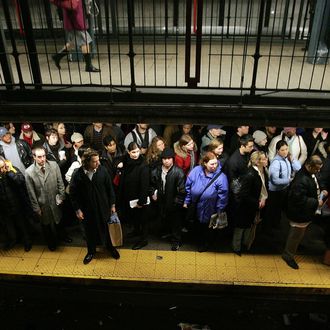
You know New York is loud. This is a given, and it’s not something most of us spend a lot of time worrying about. But we probably should: Exposure to too much noisiness for too long could permanently damage your hearing — specifically, it could harm the way the brain actually processes sound, according to the results of an experiment in rats from scientists at the University of Texas at Dallas.
According to the press release:
To simulate two types of noise trauma that clinical populations face, UT Dallas scientists exposed rats to moderate or intense levels of noise for an hour. One group heard a high-frequency noise at 115 decibels inducing moderate hearing loss, and a second group heard a low-frequency noise at 124 decibels causing severe hearing loss.
The researchers then observed the neural responses in the rats’ brains one month after the hour-long noise exposure, and they found that in both groups, the neuron reaction time had slowed compared to earlier tests. While you might’ve heard before that prolonged exposure to loud noises can cause physical damage to your ears (via the hair cells), scientists are now finding that the damage goes even deeper than that, impacting the way your brain functions. And once the damage is done, there’s no repairing it.
Then there’s this little tidbit:
Regular exposure to sounds greater than 100 decibels for more than a minute at a time may lead to permanent hearing loss, according to the NIDCD.
You know what else is 100 decibels? Subway stations. Specifically, the Astor Place subway station reaches 101 decibels; Union Square has been measured at 106. Of course, rats are rats and people are people, and it’s too soon to say definitively whether this work applies to humans. Still, now I’m imagining little hard-of-hearing subway rats running around the tracks, gesturing wildly and imploring each other to speak up, please.




